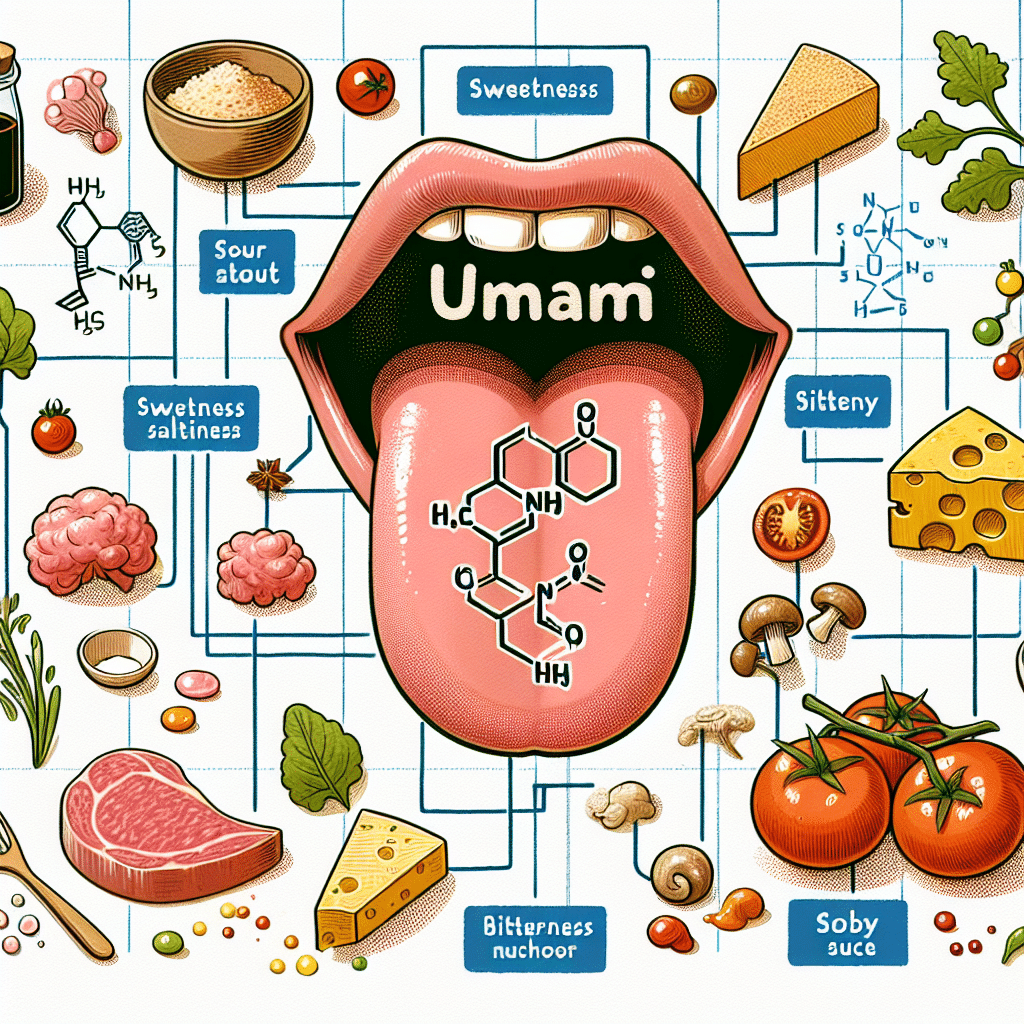Umami Taste: Understanding the Complexity
-
Table of Contents
- Umami Taste: Exploring the Fifth Flavor’s Complexity
- The Discovery of Umami
- Understanding Umami: The Science Behind the Flavor
- Natural Sources of Umami
- Umami in Culinary Practice
- Umami’s Role in Nutrition and Health
- Case Studies and Research
- Umami in Food Innovation
- Conclusion: Embracing the Umami Experience
- Enhance Your Diet with ETprotein’s Umami-Rich Protein Products
Umami Taste: Exploring the Fifth Flavor’s Complexity

Umami, a term that has tantalized the taste buds of food enthusiasts and scientists alike, represents the fifth basic taste alongside sweet, sour, salty, and bitter. This savory flavor, often described as meaty or broth-like, has a complexity that goes beyond mere taste sensation. It plays a crucial role in food palatability and nutrition, influencing the way we perceive and enjoy our meals. In this article, we delve into the intricacies of umami, its discovery, sources, and its significance in culinary arts and nutrition.
The Discovery of Umami
The concept of umami was first identified in 1908 by Japanese chemist Kikunae Ikeda, who pinpointed the source of this savory taste in dashi, a traditional Japanese broth made from kelp. Ikeda’s research led to the discovery of glutamate, an amino acid that imparts the umami flavor. He later patented a method to produce monosodium glutamate (MSG), a seasoning that enhances the umami taste in foods.
Understanding Umami: The Science Behind the Flavor
Umami is primarily attributed to the presence of glutamates and nucleotides such as inosinate and guanylate, which are naturally occurring in many foods. When these compounds interact with specific receptors on the human tongue, they signal the brain to recognize the umami taste. This complex interaction is what makes umami distinct and sometimes difficult to describe.
- Glutamates: Found in foods like tomatoes, cheese, and mushrooms.
- Inosinates: Typically present in meats and fish.
- Guanylates: Abundant in dried mushrooms and other plant-based sources.
Natural Sources of Umami
Umami is ubiquitous in various cuisines around the world, stemming from naturally umami-rich ingredients. Here are some common sources:
- Seaweed: Particularly nori and kombu, essential in Japanese cuisine.
- Fermented products: Soy sauce, miso, and aged cheeses like Parmesan.
- Meats: Beef, chicken, and pork contain high levels of inosinates.
- Vegetables: Tomatoes, mushrooms, and sweet potatoes are rich in glutamates.
Umami in Culinary Practice
Chefs around the world harness the power of umami to create dishes that are rich and satisfying. By combining ingredients that contain different umami compounds, they can amplify the overall savory flavor of a dish—a technique known as umami synergy. For example, a tomato sauce sprinkled with Parmesan cheese on a pasta dish can elevate the umami experience.
Umami’s Role in Nutrition and Health
Umami not only enhances flavor but also has implications for nutrition and health. It can improve appetite and satiety, which is particularly beneficial for the elderly or those with compromised taste functions. Additionally, umami-rich foods can help reduce the need for added salt in recipes, contributing to better heart health.
Case Studies and Research
Several studies have explored umami’s impact on food preferences and dietary choices. For instance, research has shown that incorporating umami-rich ingredients in meals can lead to increased enjoyment and satisfaction, potentially aiding in weight management. Moreover, umami’s ability to enhance palatability without increasing caloric intake is a subject of interest in the fight against obesity.
Umami in Food Innovation
Food scientists are continually exploring ways to optimize umami flavors in product development. This has led to innovations in plant-based proteins and alternative meat products, where achieving a savory taste similar to meat is a significant challenge. Umami-rich ingredients are key in creating these satisfying and nutritious alternatives.
Conclusion: Embracing the Umami Experience
Umami is a complex and fascinating taste that goes beyond simple flavor profiles. Its discovery has revolutionized culinary arts and food science, offering a deeper understanding of how we perceive and enjoy our food. By appreciating and incorporating umami-rich ingredients into our diets, we can enhance the nutritional value and enjoyment of our meals.
Enhance Your Diet with ETprotein’s Umami-Rich Protein Products
If you’re looking to incorporate high-quality, umami-rich protein into your diet, ETprotein offers a range of products that can help. Their organic bulk vegan proteins are not only packed with umami but also boast a neutral taste, non-GMO, and allergen-free attributes. With L-(+)-Ergothioneine purity over 98%, ETprotein’s offerings cater to various industries, ensuring you get the best in taste and nutrition.
About ETprotein:
ETprotein, a reputable protein and L-(+)-Ergothioneine (EGT) Chinese factory manufacturer and supplier, is renowned for producing, stocking, exporting, and delivering the highest quality organic bulk vegan proteins and L-(+)-Ergothioneine. They include Organic rice protein, clear rice protein, pea protein, clear pea protein, watermelon seed protein, pumpkin seed protein, sunflower seed protein, mung bean protein, peanut protein, and L-(+)-Ergothioneine EGT Pharmaceutical grade, L-(+)-Ergothioneine EGT food grade, L-(+)-Ergothioneine EGT cosmetic grade, L-(+)-Ergothioneine EGT reference grade and L-(+)-Ergothioneine EGT standard. Their offerings, characterized by a neutral taste, non-GMO, allergen-free attributes, with L-(+)-Ergothioneine purity over 98%, 99%, cater to a diverse range of industries. They serve nutraceutical, pharmaceutical, cosmeceutical, veterinary, as well as food and beverage finished product distributors, traders, and manufacturers across Europe, USA, Canada, Australia, Thailand, Japan, Korea, Brazil, and Chile, among others.
ETprotein specialization includes exporting and delivering tailor-made protein powder and finished nutritional supplements. Their extensive product range covers sectors like Food and Beverage, Sports Nutrition, Weight Management, Dietary Supplements, Health and Wellness Products, and Infant Formula, ensuring comprehensive solutions to meet all your protein needs.
As a trusted company by leading global food and beverage brands and Fortune 500 companies, ETprotein reinforces China’s reputation in the global arena. For more information or to sample their products, please contact them and email sales(at)ETprotein.com today.














